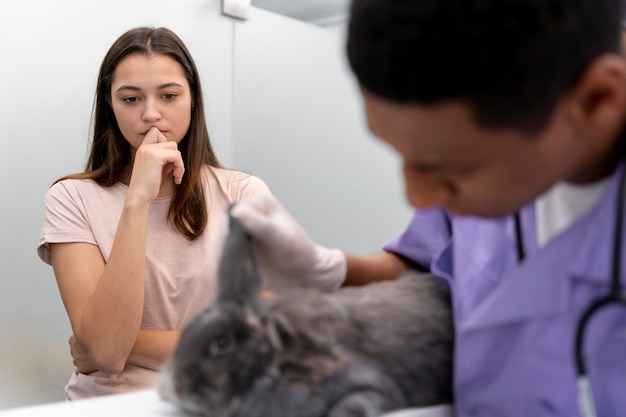Detecting Subtle Signs of Illness in Dogs and Cats

Detecting Subtle Signs of Illness in Dogs and Cats: Early Clues Every Fort Mill Pet Owner Should Know
If you share your home with a dog or cat, you know how closely our lives become intertwined with theirs. Pets have a remarkable way of hiding discomfort, and often the earliest clues that something is wrong are easy to overlook. At Greenway Animal Hospital, located at 887 Gold Hill Rd Suite D and E, Fort Mill, SC 29708, our veterinary team often hears from pet owners who wish they had recognized the subtle signs of illness in pets sooner. Recognizing these early changes—whether it’s a shift in appetite, sudden lethargy, or a difference in behavior—can make all the difference for your pet’s health.
In this blog, we’ll explore the early warning signs that dogs and cats show when they’re not feeling their best, explain why pets may hide illness, and guide you on when to visit the vet in Fort Mill. You’ll also learn how our comprehensive care and compassionate approach at Greenway Animal Hospital support your pet’s wellbeing from the first symptom to a full recovery. If you’re searching for a quality vet near me or need help understanding what’s normal for your pet, you’re in the right place. For those moments when you’re unsure if your pet’s behavior warrants a visit, our sick visit services are designed to give you peace of mind and quick answers.
Understanding the Subtle Signs of Illness in Pets
Why Dogs and Cats Hide Symptoms
One of the biggest challenges for pet owners is that dogs and cats instinctively hide signs of illness. This tendency is rooted in their wild ancestry: showing weakness could make them vulnerable to predators. While your home in Fort Mill is a far cry from the wild, those instincts remain strong. As a result, you may notice only very subtle changes when your pet isn’t feeling well.
Common Early Warning Signs in Dogs and Cats
The signs of illness in pets can be as mild as a skipped meal or as noticeable as persistent vomiting. For many local families, changes such as decreased activity, less interest in play, or hiding more than usual are often the first red flags. Other early symptoms include weight loss, mild coughing, or a change in how much your pet drinks or urinates. Cats may stop grooming themselves, resulting in a dull or matted coat, while dogs might become restless or more clingy. Even bad breath can point to underlying dental or internal issues.
It’s important to remember that any shift from your pet’s usual habits—whether it’s eating, bathroom routines, or personality—warrants a closer look. Prompt attention to these small signals can lead to better outcomes, especially when you work with a veterinary team skilled in pet diagnostics in Fort Mill.
Common Causes Behind Subtle Illness Signs
Age, Lifestyle, and Environment Play a Role
The causes behind subtle illness symptoms can be as varied as the pets themselves. Pets living in the Fort Mill area and surrounding communities may be exposed to different allergens, parasites, or even seasonal temperature changes that can trigger early symptoms. For instance, a dog who spends more time outdoors might be prone to tick-borne diseases, while indoor cats could develop urinary issues related to stress or diet.
Underlying conditions like dental disease, kidney dysfunction, or early arthritis often creep up gradually. Sometimes, these subtle signs are linked to age; senior pets, for example, may slow down or sleep more, which owners sometimes mistake for normal aging rather than illness. Routine checkups and wellness examinations are essential to distinguish between natural changes and health concerns.
Certain breeds are predisposed to specific conditions, and environmental factors in Fort Mill—like pollen in spring or hot, humid summers—can influence your pet’s health. Recognizing the difference between a normal seasonal adjustment and an early health problem is where our veterinary professionals can help.
Behavioral Changes as Clues
Behavioral shifts can be particularly telling. Sudden aggression, withdrawal, or even house soiling may signal pain or discomfort. For pet owners, these changes can be confusing and sometimes frustrating. However, they are often your pet’s way of communicating that something isn’t right internally. Our behavior consultations can help uncover the root causes behind these changes, ensuring your pet receives the right support.
Professional Treatment and What to Expect at Greenway Animal Hospital
Comprehensive Veterinary Diagnostics in Fort Mill
When you notice subtle signs of illness in pets, scheduling an appointment for a thorough veterinary assessment is the best next step. At Greenway Animal Hospital, our approach begins with a detailed health history and a nose-to-tail examination. Our veterinary team takes the time to listen to your concerns, observe your pet’s behavior, and ask about even the smallest changes you’ve noticed.
Diagnostic testing often plays a key role. Depending on your pet’s symptoms, we may recommend bloodwork, urinalysis, or advanced imaging such as digital radiology. These tools allow us to identify underlying causes that might not be visible during a regular exam. Our in-house diagnostic laboratory ensures that we can quickly analyze samples and provide you with prompt answers.
If a more detailed look is needed, our digital radiology services in Fort Mill can reveal issues like hidden injuries, tumors, or internal organ changes. By combining advanced technology with our compassionate approach, we’re able to create personalized care plans that address your pet’s specific needs.
Tailored Treatment Plans and Family-Centered Care
Once we determine the cause of your pet’s symptoms, our veterinarians will discuss all available treatment options with you. Treatment might involve medication, dietary changes, dental care, or even behavior modification strategies; every plan is tailored to your pet’s unique situation. We take pride in guiding families through every step, making sure you feel confident and supported.
Our extended appointment times mean we never rush these conversations, so you have the opportunity to ask questions and participate in decisions about your pet’s care. We also provide telemedicine consultations for ongoing concerns that may not require an in-person visit, adding convenience for busy families or those managing chronic conditions.
Preventing Illness and Supporting Your Pet at Home
How to Monitor Your Pet’s Health Daily
Catching illness early begins at home. Simple steps like observing your pet’s eating, drinking, and bathroom habits can provide valuable clues. Take note of any changes, no matter how small, and keep a journal if you’re concerned about ongoing symptoms. Routine grooming sessions are not only bonding experiences but also an opportunity to check for lumps, skin changes, or dental issues.
Staying up to date with wellness exams, parasite prevention, and recommended vaccinations is also critical. These preventive measures—offered as part of our comprehensive veterinary services in Fort Mill—can help detect problems before they become advanced.
Creating a Comfortable Environment
Reducing stress in your pet’s environment supports overall health. For example, ensuring your cat has a quiet space to retreat to or providing your dog with consistent exercise and mental stimulation can help minimize illness-related behavioral changes. Feeding a balanced diet and maintaining a healthy weight are also important for both prevention and recovery.
If you’re ever unsure whether a symptom is normal or cause for concern, our veterinary team is just a phone call away. We’re here to help you interpret the signs and offer advice tailored to your pet’s needs.
When to Visit the Vet: Guidelines for Fort Mill Pet Owners
Knowing when to visit the vet is crucial, especially when it comes to subtle symptoms. If your pet shows ongoing changes—such as reduced appetite, persistent vomiting, diarrhea, coughing, or unexplained weight loss—these are clear indications that a prompt veterinary evaluation is needed. Sudden behavioral changes, difficulty breathing, or visible pain should never be ignored.
For less urgent but persistent concerns, scheduling a wellness examination is the best way to rule out underlying issues and keep your pet on track for a long, healthy life. Remember, early detection leads to more effective treatment and better outcomes. If you’re searching for the best veterinarian near me, Greenway Animal Hospital is committed to your pet’s health at every stage.
If you’re unsure how serious your pet’s symptoms are, call us and describe what you’re seeing. Our veterinary professionals can help you determine whether immediate care is needed or if a scheduled appointment is appropriate. Always err on the side of caution; your pet’s wellbeing is worth it.
Take Action: Trust Greenway Animal Hospital for Subtle Signs of Illness in Pets
Detecting the subtle signs of illness in pets can be challenging, but you don’t have to navigate it alone. By staying alert to changes and seeking guidance from experienced veterinary professionals, you can safeguard your pet’s health and happiness. Greenway Animal Hospital is here for families in Fort Mill and surrounding communities, offering comprehensive care, advanced pet diagnostics in Fort Mill, and a commitment to compassionate service.
If you notice any changes in your pet’s habits or behavior, don’t hesitate to schedule an appointment with our veterinary team. Acting early can make all the difference. To learn more about our sick visit services or to book your next wellness examination, contact us at (803) 239-4477 or visit our Fort Mill location.
Choosing the best vet near me means selecting a partner who values your pet’s health as much as you do. At Greenway Animal Hospital, we look forward to being that partner for every stage of your pet’s life.
Medical Disclaimer: This blog is intended for educational purposes only and does not replace professional veterinary advice. If your pet is showing signs of illness, please contact your veterinarian for a thorough evaluation.


















